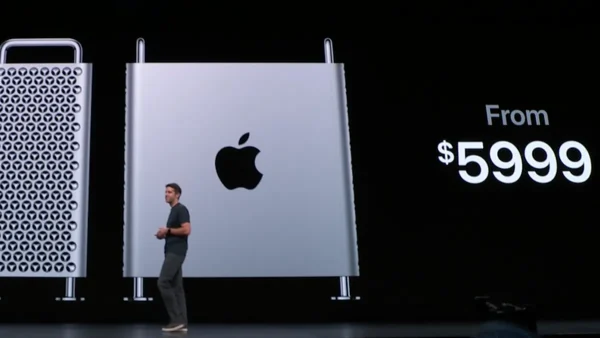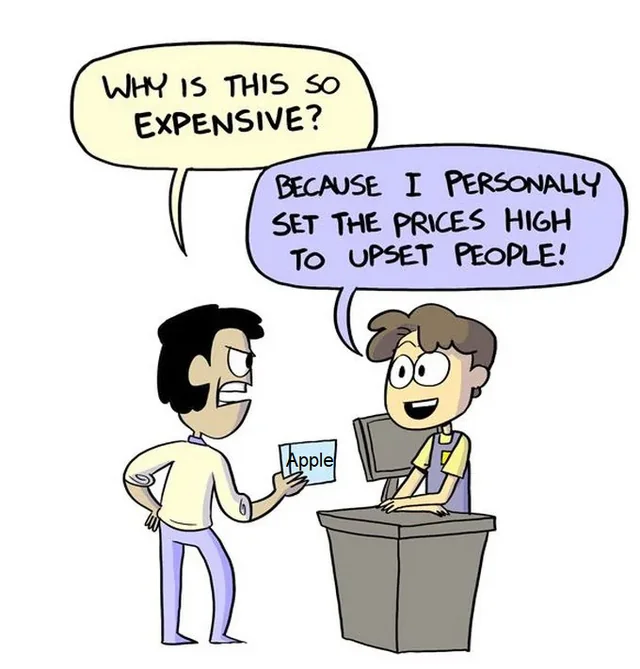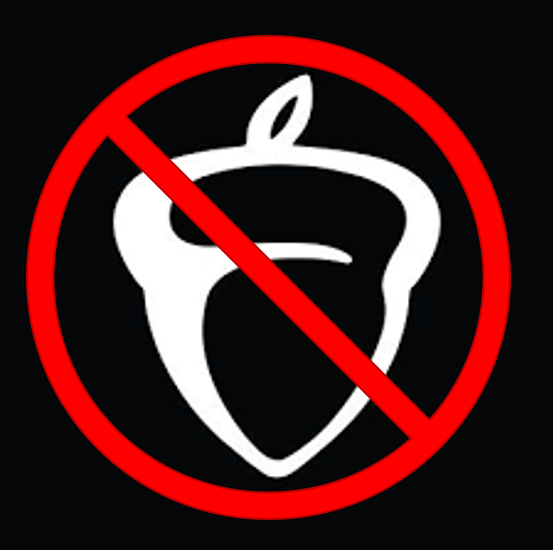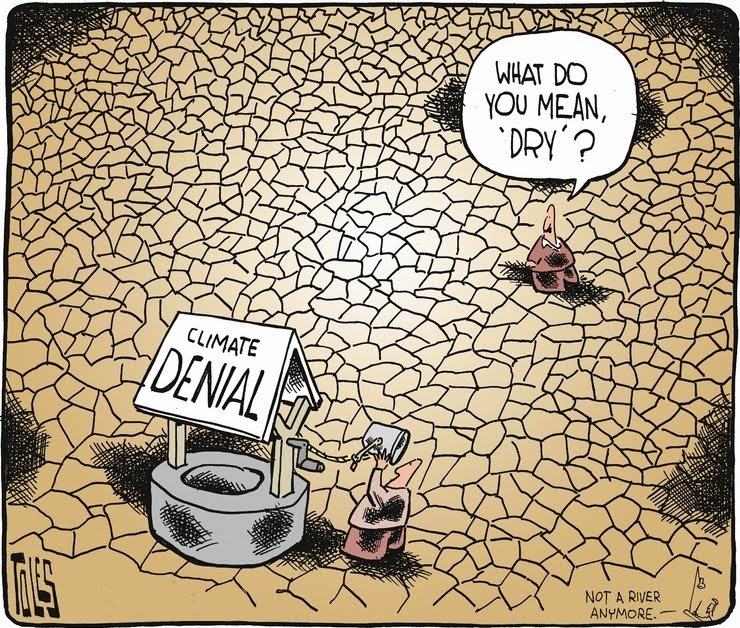Imagine saving up your hard-earned money from your part-time job, only to find out that the latest iPhone costs more than your entire savings. Or perhaps, you aspire to become a content creator, and the Macbook Pro you’ve been eyeing is priced higher than your entire summer’s earnings. This is the reality for many high school students who would like to own Apple products. Known for their sleek designs and innovative technologies, Apple has positioned itself as a luxury brand in the tech world. But at what cost? Their exorbitant pricing requires us to raise our voices to question the affordability and value. This isn’t just about consumer dissatisfaction; it’s about a system that is trying to maintain inequality. It’s time we question whether the “Apple Tax” is justifiable, or if it’s a bitter pill that we’ve been forced to swallow.
The disparity between the cost of production versus the retail prices of Apple’s products is staggering. Take, for instance, the Apple Mac Pro’s Stand, which is priced at a whopping $999. Or consider the Mac Pro’s Wheels – four small metal wheels that come with a heaping price tag of $700 (Apple). Are we expected to be Elon Musk’s children to spend hundreds of dollars on items that cost only a few cents on Ali-Express? In addition, the first iPhone was launched at $499, which adjusted for inflation, would be around $733 in 2024. Fast forward to today, and their flagship phone costs a staggering $1600. What’s more, you say? They’ve stopped including the chargers! And it doesn’t even stop there. A stick of additional RAM from Apple costs $200, while the market price for similar products is around $20. Not only is it overpriced, but users have also reported that it’s slower than its counterparts. It’s clear that the pricing strategy is not justified by the production costs; the consumers are not getting value for their money and something has to be done.

One possible solution is to involve the government in regulating monopolistic companies like Apple. Price gouging laws exist to prevent the practice of significantly raising the prices of basic necessities. We saw this during the COVID-19 pandemic when prices of hand-sanitizing products, disinfectants, rubbing alcohol, toilet paper, and tissues were ramped up. This concept of price regulation could be extended to monopolies, although it can be less strict than for basic necessities. Apple, with its significant market share, is undeniably a monopoly. Laws could be enacted to prevent companies from excessively raising prices over time without justification. This could involve setting maximum allowable price increases or requiring companies to justify price increases based on factors like increased production costs. Indeed, the government has already begun to take action. On March 21, 2024, the US Department of Justice filed an antitrust lawsuit against Apple for unlawfully exercising its monopoly power with the iPhone in the smartphone market.
While these legal actions are a step in the right direction, the government can only regulate to an extent. If Apple cites a flimsy, false reason to increase the prices, we’re bound to have problems. However, the power to effect change doesn’t lie with the government; it lies with us.
You.
And me.
We need to voice our concerns on more serious platforms beyond social media. Don’t just complain; show your dissatisfaction through your actions. If you’re truly upset about the “Apple Tax,” then stop buying their products. Support other tech companies that offer more affordable and superior products. I, too, was once drawn to the allure of Apple. I had an iPhone, an iPad, and a Macbook. But as I stepped out of the illusion, I saw the real world and realized that there were other options much better and more affordable. So, I made the switch. Consider the current Samsung’s flagship phone, the Galaxy S23. Priced at only $799, it boasts all the same features as the iPhone 15 and even surpasses it with superior screen quality. But it’s not just about phones. When it comes to computers, Windows offers a range of options that are more flexible and affordable than Apple’s Macbooks. Brands like Dell, HP, and Lenovo offer high-quality laptops that cater to different needs and budgets. So next time you’re in the market for a new phone or computer, ask yourself: Why Apple? Is it really worth the price, or are you paying for the brand? Or is it because everyone else seems to have one? Maybe it’s time for a revolution. A revolution where we, as consumers, choose products not for their brand, but for their value.
Works Cited
Apple. “Apple.” Apple, 2024, www.apple.com/.
Elharony, Amr. “The Apple Tax: Why Apple Products Cost so Much and What It Means for You .” Www.linkedin.com, 11 Apr. 2024, www.linkedin.com/pulse/apple-tax-why-products-cost-so-much-what-means-you-amr-elharony-7h6ef. Accessed 29 May 2024.
Kerner, Sean. “Apple Lawsuit History Explained.” WhatIs, 22 Apr. 2024, www.techtarget.com/whatis/feature/Apple-lawsuit-history-explained.
Letitia, James. “Price Gouging during the COVID-19 Pandemic.” Ag.ny.gov, ag.ny.gov/coronavirus/price-gouging-during-covid-19-pandemic.
Pettinger, Tejvan. “Price Gouging – Definition and Examples.” Economics Help, 16 Mar. 2020, www.economicshelp.org/blog/162072/economics/price-gouging-definition-and-examples/.
Samsung. “Buy Galaxy S24 Unlocked 128GB Smartphone | Samsung US.” Samsung Electronics America, www.samsung.com/us/smartphones/galaxy-s24/buy/galaxy-s24-256gb-unlocked-sm-s921ulbexaa/?cid=sem-mktg-pfs-mob-us-bing-na-01312024-142210-&ds_e=MICROSOFT-cr:%25ecid. Accessed 29 May 2024.
Song, Victoria. “US v. Apple: Everything You Need to Know.” The Verge, 21 Mar. 2024, www.theverge.com/24107581/doj-v-apple-antitrust-monoply-news-updates.







